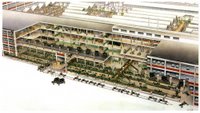Bad decisions
The first article in the August 28th issue, "The Risk Pool," was written by Malcolm Gladwell.
 He shows how the decision by GM and the rest of the automobile industry to offer company-specific pensions and health care plans rather than participate in a scheme where multiple companies collectively offered such benefits has put these companies in such a bind today. The critical factor is that the dependency ratio--the number of retirees relative to the number of active workers--had increased dramatically over the last 50 years:
He shows how the decision by GM and the rest of the automobile industry to offer company-specific pensions and health care plans rather than participate in a scheme where multiple companies collectively offered such benefits has put these companies in such a bind today. The critical factor is that the dependency ratio--the number of retirees relative to the number of active workers--had increased dramatically over the last 50 years:In 1962, G.M. had four hundred and sixty-four thousand U.S. employees and was paying benefits to forty thousand retirees and their spouses, for a dependency ratio of one pensioner to 11.6 employees. Last year, it had a hundred and forty-one thousand workers and paid benefits to four hundred and fifty-three thousand retirees, for a dependency ratio of 3.2 to 1.(A year ago Gladwell wrote "The Moral-Hazard Myth: The bad idea behind our failed health care system" which was published in the August 29, 2005, issue of The New Yorker. It explored a shift in the insurance industry to increasingly group the insured into smaller pools, thus gradually eliminating much of the benefit of spreading risk across the greatest number of people.)
The second, shorter article on GM, "Dealer's Choice," appeared in the September 4th issue; in it James Surowiecki examines how the auto industry's decision to use franchised dealerships rather than company-owned outlets has tightly constrained their ability to adapt to changing market conditions.
Labels: economy





0 Comments:
Post a Comment
<< Home